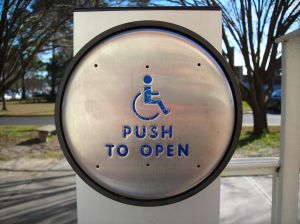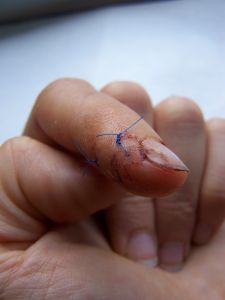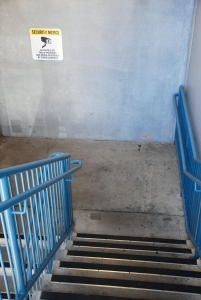Duarte v. CA. State Teachers’ Ret. Sys., a case from the Court of Appeal for California, First Division, involved claimant who was a teacher for the state’s unified school district. He worked as a teacher there from 1993 to 1995. Claimant took personal leave in 1995 that was authorized but unpaid and then took educational leave until 1999. During his leave, claimant worked for one season as a firefighter for the state forestry department. He also completed law school, but, after failing to pass the state bar exam, began working as a paralegal.
 In 2003, claimant returned to the school system, and his second day back on the job, two students he refused to let into the classroom due their disruptive behavior assaulted him. His specific claim was that one student injured his shoulder when he pushed claimant into the doorframe to get past him. He also alleged one student continued to the threaten him and told claimant “[he] was going to put a put a cap in his ass.” The other students repeatedly mocked claimant for the remainder of the day, making teaching virtually impossible. Claimant never returned to teach at the school.
In 2003, claimant returned to the school system, and his second day back on the job, two students he refused to let into the classroom due their disruptive behavior assaulted him. His specific claim was that one student injured his shoulder when he pushed claimant into the doorframe to get past him. He also alleged one student continued to the threaten him and told claimant “[he] was going to put a put a cap in his ass.” The other students repeatedly mocked claimant for the remainder of the day, making teaching virtually impossible. Claimant never returned to teach at the school.
Continue reading
 Massachusetts Workers Compensation Lawyers Blog
Massachusetts Workers Compensation Lawyers Blog


 While driving, claimant was struck from behind by a shovel bucket of another huge piece of mining equipment. According to court records, the shovel bucket was large enough to hold an automobile. It hit the rack of the dump truck located behind the operator’s cab. Claimant testified the force from the impact caused his entire body to go numb and to nearly knock him unconscious. He was not sure where he was or what he was doing following the collision and was taken to the emergency room.
While driving, claimant was struck from behind by a shovel bucket of another huge piece of mining equipment. According to court records, the shovel bucket was large enough to hold an automobile. It hit the rack of the dump truck located behind the operator’s cab. Claimant testified the force from the impact caused his entire body to go numb and to nearly knock him unconscious. He was not sure where he was or what he was doing following the collision and was taken to the emergency room. Employer’s insurance company was unable to find a center he could afford on the less than $400 he was receiving in workers’ compensation benefits they were paying him. He was also unable to seek federal disability assistance under the Social Security Administration (SSA) due to his status as an undocumented worker from Mexico. Even without an assisted living facility, he was in need of wheelchair accessible housing, with appropriate accommodations, and access to public transportation. Employer’s insurance company case manager tried to assist him with finding suitable housing but was again unable to help him.
Employer’s insurance company was unable to find a center he could afford on the less than $400 he was receiving in workers’ compensation benefits they were paying him. He was also unable to seek federal disability assistance under the Social Security Administration (SSA) due to his status as an undocumented worker from Mexico. Even without an assisted living facility, he was in need of wheelchair accessible housing, with appropriate accommodations, and access to public transportation. Employer’s insurance company case manager tried to assist him with finding suitable housing but was again unable to help him. The state workers’ compensation bureau awarded claimant benefits for the amputation of his four fingers after the accident, allowed a further claim for a one-third disability in his index finger in 1985, and another claim in 1990 for two-thirds loss of his other three fingers.
The state workers’ compensation bureau awarded claimant benefits for the amputation of his four fingers after the accident, allowed a further claim for a one-third disability in his index finger in 1985, and another claim in 1990 for two-thirds loss of his other three fingers. In this accident, his employer was self-insured, accepted liability for workers’ compensation, and paid for all medical bills related to his rotator cuff surgery and lost wages associated with his disability rating.
In this accident, his employer was self-insured, accepted liability for workers’ compensation, and paid for all medical bills related to his rotator cuff surgery and lost wages associated with his disability rating. Her husband drove her to the hospital that day, and doctors diagnosed her with fractures in one of her fingers and the fifth metacarpal of her left hand. Intake records show she was able to walk, her main complaint was pain in her hand, and she denied any other injuries from the fall.
Her husband drove her to the hospital that day, and doctors diagnosed her with fractures in one of her fingers and the fifth metacarpal of her left hand. Intake records show she was able to walk, her main complaint was pain in her hand, and she denied any other injuries from the fall. After reaching this settlement, plaintiff filed a wrongful death civil lawsuit against employer and obtained a default judgment in the amount of $9.525 million in damages. After the default judgment was entered, employer refused to pay the judgment. At this point, plaintiff sued employer again in state court, alleging employer breached its agreement under their liability policy. Employer had the case removed to federal court.
After reaching this settlement, plaintiff filed a wrongful death civil lawsuit against employer and obtained a default judgment in the amount of $9.525 million in damages. After the default judgment was entered, employer refused to pay the judgment. At this point, plaintiff sued employer again in state court, alleging employer breached its agreement under their liability policy. Employer had the case removed to federal court. A year later, when claimant was using a power auger to clear a kitchen sink drain in a hotel, her right glove became caught in the auger and crushed her wrist and hand. Doctors initially diagnosed claimant with a hand sprain and two finger sprains and bruises. She was eventually cleared to return to work full time, but her supervisor felt she was not physically capable of performing the work in the manner she could before the on-the-job injury.
A year later, when claimant was using a power auger to clear a kitchen sink drain in a hotel, her right glove became caught in the auger and crushed her wrist and hand. Doctors initially diagnosed claimant with a hand sprain and two finger sprains and bruises. She was eventually cleared to return to work full time, but her supervisor felt she was not physically capable of performing the work in the manner she could before the on-the-job injury.